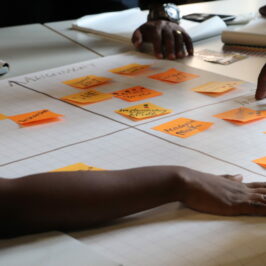In 2020, over 155 million people listened to a podcast every week. Academics and research organisations, encouraged by the potential of this large audience, have started to pay attention to this new channel of communication.
CommsConsult is a huge fan of audio. So we were delighted to be approached by longtime clients to produce a podcast focusing on their pioneering global research. Adolescents in crisis: unheard voices is the result. Launched to coincide with the International year of the girl child on Monday October 11th, the series of five episodes gives voice to adolescents – their lives, their stories, their aspirations and their hopes for the future.
The series draws on landmark research by the GAGE programme (Gender and Adolescence: Global Evidence), a nine-year endeavour led by the Overseas Development Institute working in collaboration with 35 development and research partners. Over a period of nine years, they are speaking to over 20,000 young people to generate evidence on ‘what works’ to enable adolescent girls and boys to emerge from poverty and fast-track social change for young people, their families and communities.
The power of voice
GAGE asked CommsConsult to help them bring to life the stories and voices of millions of adolescents around the world who are forced to flee their homes. The UN estimates that of the 70 million people displaced because of persecution, climate crises and conflict, nearly half of those are under 18. Over the five podcast episodes you will hear from adolescents forced to flee their homes and living in refugee camps and host communities in Rwanda, Ethiopia, Lebanon, Gaza, Jordan and Bangladesh.
Episode #1 sets the scene for the series. “Life is not good in this camp”: adolescent refugees tell their story Khalid, a 13 year old Syrian refugee living in a tent in Jordan with his family, and Fatima, a mother of two small children who was brutally forced from her home at the age of 18. She lives in a government-supported centre for internally displaced people south of Addis Abiba in Ethiopia. Like the many thousands of young refugees they both face many vulnerabilities because of their legal status. Forced to grow up fast, any employment is confined to sectors such as agriculture and manufacturing that require low skills and are rewarded with low pay, no benefits and no health insurance.
For all the agencies tasked with supporting refugees and internally displaced persons, understanding the different needs of adolescents is vital to designing age and gender appropriate support and services. Listening to the voices of the young people affected by humanitarian crises is the first important starting point.
The power of podcasts
The podcast is a powerful format, perfectly suited to our fast-paced, multi-tasking lives. It lends itself to storytelling which invites engagement and debate and, in the process, helps to refine and inform the research itself. Podcasts reach a diversity of actors, putting research on a completely new platform and increasing the odds that new audiences will hear about your work and its impact. They allow a body of work to be found long after they have been produced: this is especially important for specialist topics which can be found by a small community of people over a long period time – the ‘long tail’ of marketing.
This is our second podcast production this year led by Cornwall-based journalist Martha Dixon. When she’s not swimming in all weathers and seasons in our local seas, Martha produces podcasts and radio features mainly for BBC Radio 4 and World Service Radio. The production has been both eye-opening and an emotional journey for her. She says: “What’s it really like to live in a refugee camp as a teenager with big dreams ? The answers are both heartbreaking and uplifting. This series has provided such an incredible insight into the lives of everyday boys and girls caught up in impossible situations. The world needs to hear these voices and act now.”
Martha is becoming, rather wonderfully, a CommsConsult ‘old hand’. She led our journey into podcast production from the front, producing ‘Louder than Words’, the podcast produced for the Centre for Public and Policy Engagement at the University of Essex. Currently in its second season, the podcast brings together leading researchers, policy makers, thinkers and campaigners on a range of global issues plus those directly affected. Topics include dealing with disasters, brain injury and inequality.
If you think you have a story to tell and want to explore the potential of working with audio, get in touch. We’d love to help.



Leave a Reply